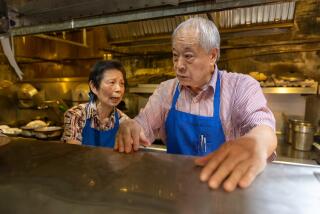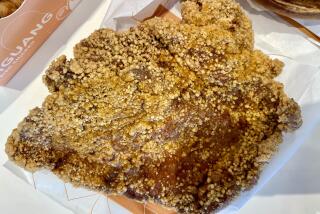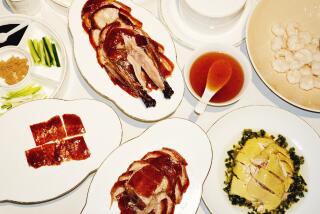A Slice of History in China’s Most Famous Duck
BEIJING — George H.W. Bush. Yasser Arafat. Fidel Castro. Kim Jong Il. These are only a few of the luminaries who have eaten at Quan Jude, China’s legendary roast duck restaurant.
Far less known is Yang Zongman, a compact, serious 54-year-old woman who is an assistant manager at the government-owned culinary landmark. Standing next to the restaurant’s tall, animated hostesses in their slinky evening dresses, she might be mistaken for a midlevel manager hopelessly behind the times.
But Yang isn’t likely to leave the restaurant anytime soon. She is the great-great-granddaughter of the man who opened Quan Jude in 1864 as a tiny family restaurant.
“Many guests ask to see the descendant of the original owners,” said Yang, whose business card includes the word “descendant” as if it were a job title. “I work almost 365 days a year. A lot of our steady customers come because of me. So I have to be here.”
Yang’s story, and the story of Quan Jude, in many ways reflects the ups and downs of China’s business enterprises over the last 14 decades.
Yang’s great-great-grandfather Yang Quanren was a small-time peddler who sold live poultry in the market at the foot of the walled city where Chinese emperors lived. One day, a store selling dried fruit went out of business. Yang Quanren seized the opportunity to open a small restaurant.
He soon added roast duck to his repertoire.
When he died, his children took over. They put new dishes on the menu, perfected the open-pit roasting style and turned Quan Jude into a full-fledged restaurant and one of the best-known names in old Beijing.
Business ebbed and flowed as China made the transition from centuries of imperial rule to a wobbly republic and plunged into years of civil war. By the late 1940s, the economy had collapsed and the streets were all but empty of potential customers.
According to official accounts, it was the communists who saved Quan Jude from extinction.
After Mao Tse-tung’s army took over China in 1949, his new government abolished all private property. Restaurants were no exception, although initially, officials called Quan Jude a “joint venture” between the public and private sectors.
In 1952, Yang Zongman’s father, Yang Fulai, became the assistant manager in charge of Quan Jude’s daily operations. His boss was a communist, who monitored the activities of his new partner and the political leanings of the staff.
Business started to increase. But then the radical Cultural Revolution started in 1966, and Quan Jude became a target of the all-out attack on traditions. Red Guards yanked down the restaurant’s century-old hand-carved marquee and tossed it out as firewood. A museum worker risked his life to hide the plaque until the end of the chaotic decade.
A crazed mob then plastered the main halls of Quan Jude with posters of Mao and his sayings. In place of a large landscape painting, the mob put up a banner that read, “Unite People of the World. Down with American Invaders and All Their Running Dogs!”
Yang’s father was branded a capitalist and was banished to the countryside to raise pigs. Guilty by association, Yang, too, was sent away. Her destination was the frozen northwest, the Chinese equivalent of Siberia.
“I was only 17,” Yang recalled. “I dug ditches, planted rice, herded horses, fed pigs, ducks, geese, you name it. We did the dirtiest work and slept in a pigsty. I saw no hope in sight.”
That life lasted 10 years. Thinking she might never again go home, she married her brigade leader and gave birth to two children on the farm.
As the Yang family languished in obscurity, Chinese Premier Chou En-lai was turning the roast-duck restaurant into his own unofficial political banquet hall.
In the early days of the People’s Republic, the Chinese capital lacked sophisticated restaurants to service the catering needs of its new leaders. Ever the graceful host and charming politician, Chou saw the diplomatic potential in the traditional Peking duck.
According to official accounts, Chou often took specially prepared duck from Quan Jude to entertain guests on his overseas trips. Comedian Charlie Chaplin was said to have tasted the Chinese delicacy in Geneva in 1954. Vietnamese leader Ho Chi Minh received a special delivery of the dish in the 1960s while recovering from illness in Hanoi.
And then there was Henry Kissinger.
President Nixon’s special envoy went to China in 1971 to begin secret discussions that eventually led to a detente between the United States and China. According to a Chinese tale, a 12-course lunch featuring duck from Quan Jude helped put Kissinger and fellow Americans at ease during the first encounter with Chinese leaders at the colossal Great Hall of the People. Chou personally showed Kissinger how to wrap the Chinese crepe around the thinly sliced meat and lavished his guests with his classic hospitality.
The next year, Nixon made his historic trip to China to normalize relations.
Calling it “duck diplomacy,” Yang said, “Who knew our little duck restaurant could also play a role in global politics.”
Yang did not witness the events. She returned to Beijing from the countryside in 1978, two years after Chou died.
Chou’s duck legacy continued as the nation opened to the outside world, with Quan Jude playing a special role as the culinary face of new China.
As a result, the old storefront was no longer big enough for the job. In 1979, the government opened a six-story banquet hall designed to accommodate the swelling ranks of the restaurant’s international visitors.
With China’s economy rising, another branch was later opened to meet the expanding tastes of the country’s emerging middle class. Customers poured in for a bite of old Beijing.
Over the years, as private business began burgeoning, Kentucky Fried Chicken and McDonalds opened their first outlets not far from Quan Jude’s original site. Chinese customers queued up in record numbers.
“Their entry into China gave a big jolt to the Chinese food industry,” said Jiang Junxian, general manager of Quan Jude Group. “We learned for the first time what is fast food, what is franchise.”
Jiang had been impressed with the idea of franchising during a visit to Los Angeles in 1988. “We stayed at Best Western, and we saw the same fast-food outlets everywhere we went,” he recalled. “I liked that business model, and I wanted to try it in China.”
In 1993, Jiang’s vision became a reality. “China’s franchising business began with Quan Jude,” he said.
Today, China has 51 Peking duck restaurants bearing Quan Jude’s three-character gold-on-black logo. Together they serve about 3 million ducks a year.
But not all has proved ducky for Quan Jude.
Some provincial outlets went out of business because they couldn’t maintain standards on the food. Moreover, private competitors have proved a mighty challenge for a state-owned enterprise.
Despite efforts to improve, Quan Jude remains bogged down by a bloated staff and bad habits.
For example, to the surprise of foreign visitors, last call at the flagship restaurant near the Forbidden City is 8 p.m. Technically, diners can stay until they’re done eating. But by about 9:30 p.m., the lights are dimmed and workers practically sweep the remaining patrons out the door. That could prove fatal to the restaurant, considering how fast competition from the private sector is growing.
When Quan Jude started adding to its original three restaurants, perhaps a dozen other restaurants in Beijing were serving Peking duck. Today that number may be as high as 1,000, Jiang said.
To help boost business, Quan Jude’s management recently invested in a 32-part TV series based on the restaurant’s early history. To grab an increasingly commercial audience, and much to the dismay of the Yang family, the plot was thickened with extramarital liaisons, beautiful cross dressers and plotting eunuchs.
“They call it historic fiction, let’s leave it at that,” Yang said.
She’s glad that her father didn’t live long enough to see it on prime time TV. After the Cultural Revolution ended, the elder Yang returned to work as assistant manager at the government establishment. Hoping to see the return of its glory days, he worked tirelessly until he suffered a paralyzing stroke in 1982, relatives said.
After he died in 1995, his daughter replaced him and became the fifth generation of Yang family to work for the restaurant.
But she said the only reason she decided 24 years ago to take a kitchen job here making cold cuts was because “I was looking for a reliable state-owned enterprise to support my family.”
Over the years, a parade of dignitaries has passed before her. She was most impressed with former President Bush, who ate there in 1995 with his wife, Barbara, because he charged the meal to his own credit card, she said.
There were members of the International Olympics Committee, a former secretary-general of the United Nations, foreign tour groups big and small. Yang was there to do her ancestors and her country proud.
“I work hard because I want at least this original branch of Quan Jude to be the best in the business,” she said, showing her guests around the refurbished two-story banquet hall noisy with noontime dinners. “The old Yang family should feel good to see that business is hot, whoever is running it.”
More to Read
Eat your way across L.A.
Get our weekly Tasting Notes newsletter for reviews, news and more.
You may occasionally receive promotional content from the Los Angeles Times.







